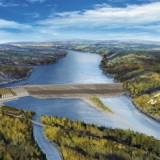Editor’s Note: Despite the criticism of BC Hydro’s big-dollar infrastructure plans by the BC Liberal Government following its handpicked panel review of the utility’s proposed rate hikes, Energy Minister Rich Coleman maintains it’s full steam ahead for the $8 Billion-plus proposed Site C Dam.
So what is a “command economy”? Most readers will immediately think of examples like North Korea, the former USSR and China. The term is used as a put down by smug westerners dismissing socialist, centrally-planned states that generally suppress freedom and private ownership.
Well sorry to disappoint but it is not at all about politics but about control of public assets by an individual or a small group who usually have self-interest as their principal reason for all they do and say. There are many definitions of the term and here is one:
“An economy in which business activities and the allocation of resources are determined by government order rather than market forces.”
There are several places to begin but a good start is to consider the government’s directions given to establish a power generation facility on the Peace River, known as Site C Dam. The place to begin is at “Bill 17- 2010: Clean Energy Act”, followed by “The BC Energy Plan”.
By these and supporting directives our Government is giving its commands. In the words of West Coast Environmental Law, the Clean Energy Act “eliminates independent oversight of the BC Utilities Commission for the Site C dam.” This act also establishes a mandate that “BC must achieve energy self-sufficiency, that it must have an electricity surplus of 3,000 gigawatt hours by 2020, and that it will become a net exporter of electricity.” (These self-sufficiency and insurance requirements were criticized in the recent panel report on Hydro’s finances).
Now we know who is giving commands and that these commands are not based upon any credible and independent market information. To illustrate the measure of propaganda being used by our government I refer you to 1 of 7 policy action statements presented in the “2010 Energy Plan”. It is written that BC will “Maintain our competitive electricity rate advantage”.
Starting in 2006 Quebec Hydro has produced an annual report showing electricity rates for various places in North America. In 2006 BC was the place with the lowest rates for almost all customer categories. By 2010 we had slipped to being the 4th or 5th from the lowest. The Minister had to have known of this report and of the vector for BC rates before writing the above drivel in “The BC Energy Plan” he signed.
Besides giving commands to borrow, spend and build, our government has also decided it knows just how much electricity we will need in the foreseeable future, regardless of costs. In 2006 the official electricity demand “forecast” for BC customers started with a number of 58,159 GWhrs which was 14% greater than the previous year’s recorded sales. By 2011 this exaggeration had increased to a 23% differential with further widening all the way out to 2025.
Being so wrong would be of little consequence if these purposely generated errors were free of costs, but unfortunately acting on mistakes of this type become terribly expensive. Deciding to build generation plants like Site C and to contract for energy from private power companies (IPPs) – using this exaggerated outlook as the justifying rationale – only means unnecessarily high and fast rising rates. Even without the burden of Site C it now takes 60% more asset value to generate and deliver the same unit of energy to BC customers than it did just 10 years ago.
The associated debt has the same vector. It is without exaggeration that BC Hydro has presented the citizens of BC with the best possible example of how not to get efficiencies from new investments. The notion of failing to gain efficiencies from new investments is thought to be evidence of the worst feature of a “command economy” and is rightly the subject of ridicule.
In a recent public presentation, David Conway from BC Hydro proclaimed that Site C would produce electricity at about $90 per megawatt. He was also reported to have said that “BC Hydro can’t keep up with peak demand.” The reporting journalist refrained from giving the $90 figure and peak demand any context. Traditional BC Hydro generation assets produce electricity at about $35 per megawatt. During recent periods, up to and including recently, the Pacific Northwest futures trading prices per megawatt for the most expensive electricity (firm delivery) was between $35 and $45, or less than half of what he thought was so great about Site C costs.
Also missing from the article was any recognition of the declining per capita consumption of electricity in BC, a not unexpected reaction to rising rates in a quiet economy. David should have mentioned that in recent years BC Hydro has been blending IPP contracted energy with energy from legacy assets. Of the total annual amount consumed in BC, 50,000 GWhrs, about 10,000 comes from the IPP group.
This means in turn that traditional generation assets are being partially placed on standby. More importantly, this reserve of generation capacity does provide the insurance needed to meet unpredictable periods of peak demand. The further irony here is that with the introduction of the controversial new “smart metering” technology (also apparently proceeding, regardless of the recent Hydro report), BC Hydro is giving itself a new tool to manage demand peaking.
The “Command Economy” model has been the style in BC for the past decade. About $80 billion in contracts have been signed by your government outside the legislature and Site C will be an addition to this total.
A “Command Economy” is invariably one that uses the public’s assets to make very poor investments that are nowhere close to being in the public interest. That is the reality with Site C. It is not needed by any independent evidence and certainly not at the projected cost of production, nor the cost to the environment.
We in BC desperately need to recover our democracy before our government signs us into debtor’s prison.






